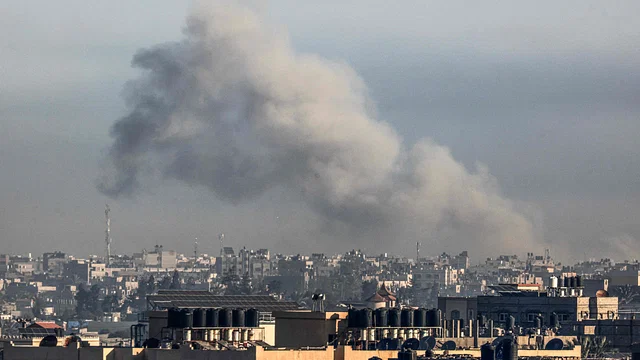In the past two days, Israeli shelling near a southern Gaza hospital has resulted in the deaths of 41 people, as reported by the Palestinian Red Crescent. The intensified attacks by Israel in the central and southern regions of the besieged territory have raised concerns about the escalating humanitarian crisis. The UN humanitarian office revealed that approximately 100,000 more displaced people have arrived in Rafah, a southern border city already grappling with a large population, due to the heightened fighting around Deir al-Balah and Khan Yunis.
Simultaneously, Egyptian officials are gearing up to receive a high-level Hamas delegation in Cairo on Friday. The talks will focus on a new proposal aimed at bringing an end to the nearly three-month-long war that has caused extensive devastation in Gaza.
The Palestinian Red Crescent condemned Israeli shelling near the Al-Amal hospital in Khan Yunis, stating that it resulted in the death of ten people and injuries to at least 21 others. The attack followed a similar incident the day before, in which 31 people lost their lives. The casualties include individuals in front of the hospital and displaced persons seeking shelter at the Red Crescent premises.
Later in the day, Gaza’s Hamas-run health ministry reported that Israeli shelling had killed 20 people, predominantly women and children, at the Shaboura camp in Rafah, near the southern border with Egypt. Footage from the city showed bloodied individuals being rushed to Kuwaiti hospital, where medical staff worked urgently to treat the influx of wounded patients, including children. The exact confirmation of whether they were victims of the same strike remains pending.
The war in Gaza, initiated by Hamas’s October 7 attack on Israel, has left the northern part of the territory in ruins, with the battlefront shifting progressively southward. Israel has pledged to dismantle Hamas in retaliation for the attack, resulting in around 1,140 deaths, mostly civilians, according to an AFP tally based on Israeli figures.
The conflict has also led to the abduction of around 250 hostages during the October 7 attack, with over half still held captive. Families of the hostages protested in Jerusalem on Thursday, demanding their safe return.
The relentless Israeli aerial bombardment and ground invasion in Gaza have resulted in at least 21,320 deaths, predominantly women and children, according to the Hamas-run health ministry. The Israeli army has reported 167 of its soldiers killed in Gaza during the conflict.
As the Israeli army recently deployed an additional brigade to Khan Yunis, the hometown of Hamas’s Gaza leader Yahya Sinwar, reports indicate sustained air and artillery strikes in the area. Israeli Minister of Defense Yoav Gallant emphasized the unprecedented missions being carried out in Khan Yunis.
The humanitarian situation in Gaza remains dire, with over 80% of the population, or 2.4 million people, displaced from their homes, living in cramped shelters or makeshift tents in the far south around Rafah. Residents are desperately searching through rubble for survivors after recent air strikes.
The Israeli siege imposed after October 7, following years of a crippling blockade, has exacerbated shortages of food, water, fuel, and medicine. Humanitarian aid convoys, primarily entering via Egypt, have provided sporadic relief.
In response to the escalating crisis, Israel announced preliminary approval for a “maritime lifeline” from Cyprus to ship aid to Gaza. Meanwhile, a Hamas delegation is set to visit Cairo on Friday to provide observations on an Egyptian plan for a ceasefire. The three-stage plan involves renewable ceasefires, a staggered release of hostages held by Hamas in exchange for Palestinian prisoners in Israel, and ultimately a ceasefire to end the war. The plan also outlines the formation of a Palestinian government of technocrats responsible for governing and rebuilding post-war Gaza. Hamas is expected to present its response and observations during the talks in Cairo. Diaa Rashwan, head of Egypt’s State Information Services, emphasized that the plan aims to bring together the views of all concerned parties with the goal of ending the loss of Palestinian lives.






